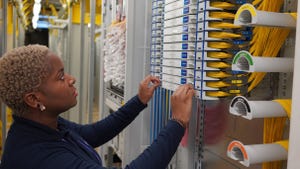Betting on Smart Homes
Cable operators seek gold in home automation and security services but face both entrenched firms and new OTT rivals.

Cable is betting big on the smart home market. With Comcast Corp. leading the charge, operators across the US are expanding into home security and automation services. They have promising visions filled with new customers and revenue growth.
Enthusiasm has spread from the largest companies, including Time Warner Cable Inc. and Cox Communications Inc., down to the tier-two and tier-three markets. Mid-tier cable company Comporium Communications not only offers its own smart home product, but also wholesales the iControl Networks Inc. technology platform as a turnkey service for providers who want expert support. Mediacom Communications Corp. also announced plans to deploy smart home services with Comporium's help in July. More wholesale customer announcements are on the way.
However, for all the excitement in the cable industry, the smart home market is shaping up to be a major battleground.
Cable operators have to compete, not only against the well-known ADT Corp. brand in the managed security space, but also against every company that pops up at retail selling smart thermostats and lighting control solutions. With the Internet as a foundation, any hardware company can build its own home automation solution out of a series of IP-connected devices.
Mike Harris, CEO of the home automation company Zonoff, Inc., compares smart home services to the television business. In his views, choosing a managed smart home solution is similar to purchasing a cable TV subscription. Buying a window sensor or lighting controller at retail, on the other hand, is more like getting video over the Web from YouTube Inc. or ordering TV episodes online from Amazon.
There is one major difference, however. In the smart home sector, retailers don't have to worry about content.
"There's some really sticky content pieces like ESPN and others that really… give those cable incumbents huge advantages over the cord cutters and the people that want to get their video content over the top," says Harris. "There really aren't those same sort of huge barriers to entry for folks to go over the top versus through a traditional security model here. There isn't the equivalent of an ESPN that's locked up, or an NFL Sunday ticket."
In the long term, it's not only the smart home that's at stake. Sensor-driven platforms could ultimately extend into virtually every aspect of life -- from smart cars, to shopping, to healthcare. Cable companies want a piece of the market now in order to create a foundation for future expansion. The smart home is only the beginning.
Who wants a smart home?
Consumers are still wrapping their heads around home automation, but evidence suggests the technology can be a powerful draw. At The Cable Show two months ago, Comcast announced that 41 percent of customers buying Xfinity home service are new Comcast subscribers. Better still for the giant MSO, almost two thirds of those new subscribers are subsequently buying Comcast's complete package of video, voice, and data services.
Comporium General Manager Dan Lehman says cameras and light controllers are the most popular accessories for cable customers. "Now I don't have to come home to a dark house,” he recites from his customers’ responses. "I have full control of that experience."
Jim Johnson, executive vice president and general manager of iControl, likens the technology's emergence to the introduction of the digital video recorder. "It's one of those products that really folks need to see to appreciate the power of it," he says. "It's kind of like DVRs back in the day. Everybody said hey, I've got a video recorder. I've got my VHS system. Why do I need DVR?" Once consumers try it out, however, they're often hooked in an instant.
At the same time, though, the security side of the smart home has lost a bit of its luster. Although cable companies regularly point out that only 20 percent of U.S. consumers currently have a home security system, they're also discovering that security is still a tough sell to the other 80 percent. Lehman notes that home automation is driving a lot more new business for cable than security. As a result, Comporium is readying a stand-alone home automation product to launch later this year, and Comcast has already separated home control services from security monitoring in the Xfinity Home offering. (See iControl Rubs Its Touchstone.)
For smaller cable companies, there's also an issue of liability with security services. Even if they outsource emergency-response management, cable companies still take on legal responsibility if anything goes wrong. Some operators will move forward with security anyway because of the revenue potential. But others will bypass that option and head straight down the home automation path.
Mid-tier MSOs get in the game
It's still early days for cable-driven smart home services. But as large operators have begun to gain traction, the mid-tier market is paying close attention. Initially, small and mid-size operators balked at launching home security and automation services because of the required resources. However, several factors have changed their thinking.
First, Comcast, Time Warner Cable, Cox, and others have all field-tested the iControl smart home platform and established its viability in a cable environment. Smaller operators no longer have to go through the process of vetting the technology if they want an easy route to service deployment. (See Services Battle Shifts to the Home.)
Second, Comporium has introduced a turnkey solution based on iControl that takes away much of the work associated with launching a smart home service. From wholesale management of the technology platform to sales, marketing, and customer support, Comporium can handle virtually every aspect of a smart home offering.
"A few years ago some [operators] were saying it's too difficult to launch this product, and that was the reason we partnered with Comporium," says iControl's Johnson. Now, however, that barrier has diminished, if not disappeared altogether.
"We don't really see the folks saying this is too difficult to deploy at this point."
The one thing that has held smaller operators back is project timing, and specifically the ability to fit a new service launch into the product pipeline. A year ago, Comporium predicted it would have eight to ten new wholesale customers within 12 months. However, the sales cycle has been slower than expected, and Lehman now says he believes Comporium will be able to announce a few more customers outside of Mediacom this year, with three to five additional operator launches following in early 2014.
The slower sales cycle, though, doesn't seem to worry Lehman, who says interest has grown "dramatically" since 2012. In fact, the way he sees it, the stage is now set for major expansion in smart home services. The business model is proven, the ecosystem is ready, and consumers have a better understanding of what exactly having a smart home means. From his perspective, Lehman believes now is the perfect time for more cable operators to get into the smart home game.
"The sooner you get in, the better you'll be."
But what about the retail market?
There are many positive signs for cable operators entering the smart home market, but that doesn't negate the fact that competition is also ramping up in the retail space. Whether it's the next smart thermostat, or the latest crowd-funded company's sensor with smartphone control apps, the retail market will present high-profile alternatives to cable's smart home services.
Zonoff's Harris sees advantages to the cable channel for new smart home offerings, but disadvantages as well. "I think that's a great channel, but I think it's just one of several great channels," he says. "There's also some backlash around my cable bill getting even more expensive… I think there are some reasons why other channels make sense as well."
There's also the fact that at retail, consumers can touch and try a smart home product before committing to a new service and a new monthly bill.
At least on that front, cable providers and iControl are working on a solution. iControl's Johnson says cable operators are "very active" in trying to figure out how to work with retailers to sell kits and devices that connect with a managed cable service. "I think we will absolutely see devices that connect with the cable, with your local cable provider's platform, on retail shelves in the next 12 months or so."
The battle has just begun
The cable industry has a lot of incentive to get smart home services right. Being successful means significant new revenue and the potential for increased uptake across the entire portfolio of cable services.
According to ABI Research, the home automation market alone is predicted to grow 45 percent annually through 2017. To the victor go the smart home spoils.
— Mari Silbey, special to Light Reading Cable
About the Author(s)
You May Also Like












